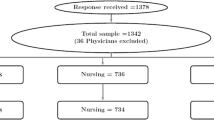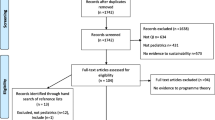Abstract
To effectively implement evidence-based practices (EBP) in behavioral health care, an organization needs to have operating structures and processes that can address core EBP implementation factors and stages. Lean, a widely used quality improvement process, can potentially address the factors crucial to successful implementation of EBP. This article provides an overview of Lean and the relationship between Lean process improvement steps, and EBP implementation models. Examples of how Lean process improvement methodologies can be used to help plan and carry out implementation of EBP in mental health delivery systems are presented along with limitations and recommendations for future research and clinical application.
Similar content being viewed by others
References
McHugh RK, Barlow D. The Dissemination and Implementation of Evidence Based Treatments. American Psychologist, 20130, 65, 73-84.
National Institute of Clinical Excellence, Depression: Management of Depression in Primary and Secondary Care (Clinical Guideline 23). London, Nice 2004.
Shahran R, Clark DM, Fairburn CG, et al. Mind the Gap: Improving the Dissemination of CBT. Behavior Research Therapy, 2009, 47,902-902.
Silverman WK, Hinshaw SP. The Second Special Issue on Evidence Based Psychosocial Treatments for Children and Adolescents. Journal of clinical Child and Adolescent Psychology, 2008, 27, 1-8.
Fixsen DL, Naoom SF, Blasé KA, et al. Implementation Research: A Synthesis of the Literature, 2005. Tampa: University of South Florida, Louis de la Parte Florida Mental Health Institute, The National Implementation Research Network.
Beidas RS, Kendall P. Training Therapists in Evidence Based Practice: A Critical Review of Studies from a Systems Contextual Practice. Clinical Psychology Science and Practice, 2010, 17, 1-30.
Fixen DL, Blasé L, Naoom SF, et al. Core Implementation Components, Research on Social Work Practice, 2005, 5, 531-540.
Herschell AD, Kolko DJ, Baumann BL, et al. The Role of Therapist Training in the Implementation of Psychosocial Treatments: A Review and Critique with Recommendations. Clinical Psychology Review, 2010, 30, 448-466.
Aarons GA, Hurlburt M, Horwitz SM. Advancing a Conceptual Model of Evidence Based Practice Implementation in Public Service Sectors, Administrative Policy Mental Health, 2011, 38, 4-2.
McHugh RK, Barlow D. Dissemination and Implementation of Evidence-Based Psychological Interventions, 2012, New York, Oxford Press.
Damschroder L, Aaron D, Keith R, et al. Fostering Implementation of Health Services Research Findings into Practice: A Consolidated Framework for Advancing Implementation Science. Implementation Science, 2009, 4. 50.
Regan J, Daleiden EL, Corpita B. Integrity in Mental Health Systems: An Expanded Framework for Managing Uncertainty in Clinical Care. Clinical Psychology: Science and Practice, 2013, 20, 78-95.
Tenant C, Roberts PA. Hoshan Kanri: A Technique for Strategic Quality Management. Quality Assurance, 2000, 8, 77-99.
Resar RK. Making Noncatastrophic Health Care Processes Reliable: Learning to Walk Before Running in Creating High-Reliability Organization. Health Services Research; 2006, 41:1677-1689.
Kasul RA, Motwani JG. Successful Implementation of TPS in a Manufacturing Setting: A Case Study, Industrial Management and Data Systems, 1997, 97, 274-279.
Womack JP, Jones DT. Lean Solutions: How Companies and Customers Can Create Value and Wealth Together. New York: Free Press, 2005.
Spear SJ. Fixing Health Care from the Inside, Today, 2005, Harvard Business Review, 83, 78-91.
Weaver Al, Greeno C, Goughler DH, et al. The Impact of System Level Factors on Treatment Timeliness: Utilizing the Toyota Production System to Implement Direct Intake Scheduling in a Semi-Rural Community Mental Health Clinic. Journal of Behavioral Health Services & Research, 2013, 10: 294-395.
Reid RJ, Coleman EA, Johnson. et al. The Group Health Medical Home at Year Two: Cost Savings, Higher Patient Satisfactions and Less Burnout for Providers, Health Affairs, 20120, 29, 835-843.
Bongar B, Sullivan G. The Suicidal Patient: Clinical and Legal Standards of Care, Third Edition, 2013. Washington, D.C. APA Press
Landes SJ, Linehan MM. Dissemination and Implementation of Dialectical Behavioral Therapy: An Intensive Training Model in R.K. McHugh and D. Barlow (Eds) Dissemination and Implementation of Evidence-Based Psychological Interventions, New York, Oxford Press, 2012.
Linehan MM. Skills Manual for Treating Borderline Personality Disorder. 1993. New York: Guilford Press
Vest JR, Gamm LD. A Critical Review of the Research Literature on Six Sigma Lean and Studer Group’s Hardwiring Excellence in the United States: The Need to Demonstrate and Communicate the Effectiveness of Transformation Strategies in Healthcare, Implementation Science 2008, 7, 4-35.
Quirk MP, Soman MP, Erikson M. et al. The Adaptive Leadership Conversation, 2011, Group Practice Journal, February 13-21.
Hogan R, Kaiser RB. What We Know About Leadership, Review of General Psychology, 2005, 9 (2), 169-180.
Ebert L, Amaya Jackson L, Markiewicz J. et al. Development and Application of the NCCTS Learning Collaborative Model for the Implementation of Evidence-Based Child Trauma Treatment in R.K. McHugh and D. Barlow (Eds), Dissemination and Implementation of Evidence-Based Psychological Interventions. New York, Oxford Press, 2012
Forehand R, Dorsey S, Jones DJ. et al. Adherence and Flexibility: They Can (and Do) Coexist. Clinical Psychology: Science and Practice, 20120, 17, 258-263.
Rotheram-Borus MJ, Swendeman D, Chorpita B. Disruptive Innovations for Designing and Defusing Evidence-Based Interventions. American Psychologist, 2012, 463-476.
Toussaint M. Writing the New Playbook for U.S. Health Care: Lessons from Wisconsin, Health Affairs, 2009, 28/ 1343-1350.
Conflict of Interest
The authors have no conflict of interest to report.
Author information
Authors and Affiliations
Corresponding author
Rights and permissions
About this article
Cite this article
Steinfeld, B., Scott, J., Vilander, G. et al. The Role of Lean Process Improvement in Implementation of Evidence-Based Practices in Behavioral Health Care. J Behav Health Serv Res 42, 504–518 (2015). https://doi.org/10.1007/s11414-013-9386-3
Published:
Issue Date:
DOI: https://doi.org/10.1007/s11414-013-9386-3




